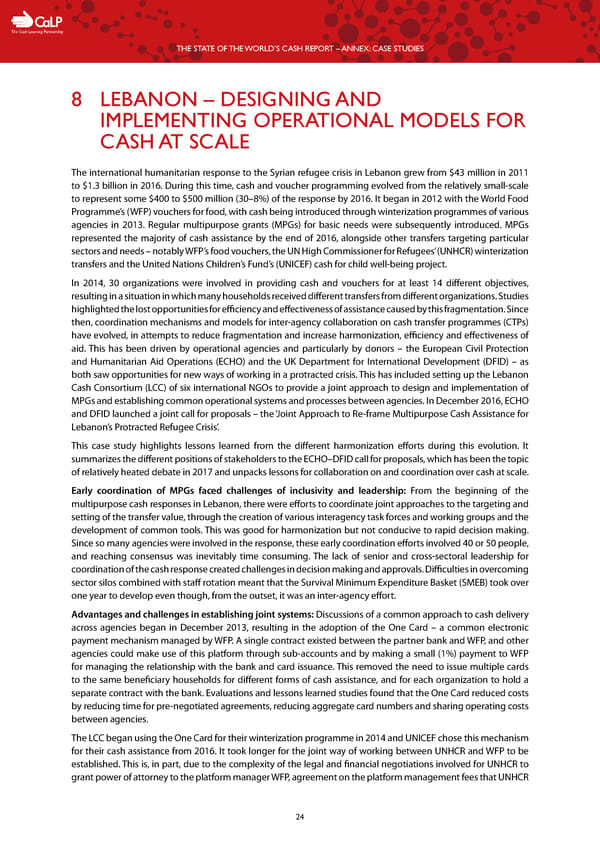C The Cash Learning Partnership THE STATE OF THE WORLD’S CASH REPORT – ANNEX: CASE STUDIES 8 LEBANON – DESIGNING AND IMPLEMENTING OPERATIONAL MODELS FOR CASH AT SCALE The international humanitarian response to the Syrian refugee crisis in Lebanon grew from $43 million in 2011 to $1.3 billion in 2016. During this time, cash and voucher programming evolved from the relatively small-scale to represent some $400 to $500 million (30–8%) of the response by 2016. It began in 2012 with the World Food Programme’s (WFP) vouchers for food, with cash being introduced through winterization programmes of various agencies in 2013. Regular multipurpose grants (MPGs) for basic needs were subsequently introduced. MPGs represented the majority of cash assistance by the end of 2016, alongside other transfers targeting particular sectors and needs – notably WFP’s food vouchers, the UN High Commissioner for Refugees’ (UNHCR) winterization transfers and the United Nations Children’s Fund’s (UNICEF) cash for child well-being project. In 2014, 30 organizations were involved in providing cash and vouchers for at least 14 different objectives, resulting in a situation in which many households received different transfers from different organizations. Studies highlighted the lost opportunities for efficiency and effectiveness of assistance caused by this fragmentation. Since then, coordination mechanisms and models for inter-agency collaboration on cash transfer programmes (CTPs) have evolved, in attempts to reduce fragmentation and increase harmonization, efficiency and effectiveness of aid. This has been driven by operational agencies and particularly by donors – the European Civil Protection and Humanitarian Aid Operations (ECHO) and the UK Department for International Development (DFID) – as both saw opportunities for new ways of working in a protracted crisis. This has included setting up the Lebanon Cash Consortium (LCC) of six international NGOs to provide a joint approach to design and implementation of MPGs and establishing common operational systems and processes between agencies. In December 2016, ECHO and DFID launched a joint call for proposals – the ‘Joint Approach to Re-frame Multipurpose Cash Assistance for Lebanon’s Protracted Refugee Crisis’. This case study highlights lessons learned from the different harmonization efforts during this evolution. It summarizes the different positions of stakeholders to the ECHO–DFID call for proposals, which has been the topic of relatively heated debate in 2017 and unpacks lessons for collaboration on and coordination over cash at scale. Early coordination of MPGs faced challenges of inclusivity and leadership: From the beginning of the multipurpose cash responses in Lebanon, there were efforts to coordinate joint approaches to the targeting and setting of the transfer value, through the creation of various interagency task forces and working groups and the development of common tools. This was good for harmonization but not conducive to rapid decision making. Since so many agencies were involved in the response, these early coordination efforts involved 40 or 50 people, and reaching consensus was inevitably time consuming. The lack of senior and cross-sectoral leadership for coordination of the cash response created challenges in decision making and approvals. Difficulties in overcoming sector silos combined with staff rotation meant that the Survival Minimum Expenditure Basket (SMEB) took over one year to develop even though, from the outset, it was an inter-agency effort. Advantages and challenges in establishing joint systems: Discussions of a common approach to cash delivery across agencies began in December 2013, resulting in the adoption of the One Card – a common electronic payment mechanism managed by WFP. A single contract existed between the partner bank and WFP, and other agencies could make use of this platform through sub-accounts and by making a small (1%) payment to WFP for managing the relationship with the bank and card issuance. This removed the need to issue multiple cards to the same beneficiary households for different forms of cash assistance, and for each organization to hold a separate contract with the bank. Evaluations and lessons learned studies found that the One Card reduced costs by reducing time for pre-negotiated agreements, reducing aggregate card numbers and sharing operating costs between agencies. The LCC began using the One Card for their winterization programme in 2014 and UNICEF chose this mechanism for their cash assistance from 2016. It took longer for the joint way of working between UNHCR and WFP to be established. This is, in part, due to the complexity of the legal and financial negotiations involved for UNHCR to grant power of attorney to the platform manager WFP, agreement on the platform management fees that UNHCR 24
 The State of the World's Cash | Case Studies Page 25 Page 27
The State of the World's Cash | Case Studies Page 25 Page 27